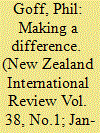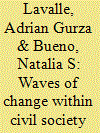|
|
|
Sort Order |
|
|
|
Items / Page
|
|
|
|
|
|
|
| Srl | Item |
| 1 |
ID:
129040


|
|
|
| 2 |
ID:
128906


|
|
|
| 3 |
ID:
106420


|
|
|
|
|
| Publication |
2011.
|
| Summary/Abstract |
Project MUSE - World Policy Journal - New Capitols of Capital Project MUSE Journals World Policy Journal Volume 28, Number 1, Spring 2011 New Capitols of Capital World Policy Journal Volume 28, Number 1, Spring 2011 E-ISSN: 1936-0924 Print ISSN: 0740-2775 Sub-Article from New Capitols of Capital São Paulo:The Best-and Worst-of Latin America Featuring Jeb Blount on São Paulo Return to Article Luiz Inacio Lula da Silva spent eight years confounding expectations as the president of Brazil. Perhaps no moment better exemplified Lula's ability to defy easy categorization than his appearance last September at the Bovespa, São Paulo's stock exchange. Lula-a gruff, bearded, working-class leader-was there to celebrate history's biggest-ever sale of stock, a $68 billion offer to government and private investors of new shares in the oil company Petroleo Brasileiro SA, usually known as Petrobras. The sale made Lula-critic of capitalism and champion of the poor -the head of the world's fourth-largest company by market value, a corporate titan nearly the size of ExxonMobil. Even Lula, who was three months from leaving office, seemed surprised by the situation. "Ten years ago I came here and people shook with fear to see me, this devourer of capitalism," Lula told the bankers, brokers and government officials gathered on the floor of the exchange. "Well, this devourer of capitalism is leaving office having honorably participated in the most auspicious...
|
|
|
|
|
|
|
|
|
|
|
|
|
|
|
|
| 4 |
ID:
107993


|
|
|
|
|
| Publication |
2011.
|
| Summary/Abstract |
For the past half a century, Latin American scholars have been pointing toward the emergence of new social actors as agents of social and political democratization. The first wave of actors was characterized by the emergence of novel agents-mainly, new popular movements-of social transformation. At first, the second wave, epitomized by nongovernmental organizations (NGOs), was celebrated as the upsurge of a new civil society, but later on, it was the target of harsh criticism. The literature often portrays this development in Latin American civil society as a displacement trend of actors of the first wave by the second wave-"NGOization"-and even denounces new civil society as rootless, depoliticized, and functional to retrenchment. Thus, supposedly, NGOization encumbers social change. The authors argue that NGOization diagnosis is a flawed depiction of change within civil society. Rather than NGOization related to the depoliticization and neoliberalization of civil society, in Mexico City and São Paulo, there has been modernization of organizational ecologies, changes in the functional status of civil society, and interestingly, specialization aimed at shaping public agenda. The authors argue that such specialization, instead of encumbering social change, brings about different repertoires of strategies and skills purposively developed for influencing policy and politics. Their argument relies on comparative systematic evidence. Through network analysis, they examine the organizational ecology of civil society in Mexico City and São Paulo.
|
|
|
|
|
|
|
|
|
|
|
|
|
|
|
|
|
|
|
|
|